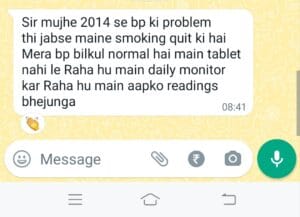

Your Heart Deserves Better
Your heart works 24/7 to keep you alive, pumping 70-80 times per minute—even when you sleep. But smoking, chewing tobacco, or consuming gutka makes your heart’s job much harder.
Every cigarette you smoke or every pouch of gutka you consume isn’t just a habit—it’s wearing down your heart and blood vessels. Cardiovascular diseases like heart attacks, strokes, high blood pressure, and clogged arteries are a leading cause of death, and smoking or chewing tobacco increases those risks significantly.
The good news? Quitting smoking or tobacco can make a big difference—starting today. In this blog, we’ll break down how smoking affects your heart, how the body starts healing after you quit, and what steps you can take to protect your heart moving forward.
How Smoking and Tobacco Use Affect the Cardiovascular System
When you smoke or chew tobacco, harmful chemicals enter your body and start affecting your heart, blood vessels, and circulation. Here’s what’s going on inside:
1. Nicotine: The Silent Killer of Circulation
- Nicotine is a stimulant that increases your heart rate and blood pressure. This puts extra pressure on your heart, forcing it to work harder to pump blood throughout your body.
- It also narrows your blood vessels (vasoconstriction), reducing blood flow to vital organs like the heart and brain.
💡 Did you know? Nicotine’s effects are the same for smokers and gutka chewers. Even though gutka users aren’t inhaling smoke, nicotine still enters the bloodstream through the mouth and affects the heart.
2. Carbon Monoxide: Poison for Your Heart
- When you smoke, carbon monoxide enters your lungs and replaces oxygen in your blood. This means less oxygen reaches your heart, muscles, and brain.
- With less oxygen to work with, your heart needs to pump harder and faster—increasing the risk of heart disease over time.
💬 Pro Tip: If you’ve quit recently, your oxygen levels improve in just 24 hours, helping your heart relax.
3. Increased Risk of Plaque Build-Up (Atherosclerosis)
- Smoking and chewing tobacco damage the lining of blood vessels, making it easier for plaque (a mix of fats, cholesterol, and toxins) to build up inside your arteries. This condition is called atherosclerosis.
- As arteries narrow and harden, it becomes harder for blood to flow freely—leading to high blood pressure and increasing the risk of a heart attack or stroke.
4. High Blood Pressure and Strokes
Both smoking and gutka consumption elevate blood pressure—which puts constant stress on the arteries. Over time, this increases the chances of:
- Heart failure (when your heart can’t pump efficiently)
- Strokes (when a clot or burst vessel blocks blood flow to the brain)
- Aneurysms (weakened blood vessels that can rupture suddenly)
How Quitting Smoking or Tobacco Heals Your Heart Over Time
The good news is that quitting smoking or chewing gutka helps your body start healing immediately. Your heart, blood vessels, and circulation gradually return to a healthier state.
1. Within 20 Minutes:
- Blood pressure and heart rate return to normal levels.
- Circulation improves, and your hands and feet feel warmer.
2. Within 24 Hours:
- The carbon monoxide level in your bloodstream drops, allowing more oxygen to reach your heart and organs.
3. Within 1 Week:
- Blood flow improves, making it easier for your heart to pump blood.
- Many of my students have noticed that their blood pressure starts stabilizing within just a week of quitting.


4. Within 1 Month:
- The lining of your blood vessels begins to heal, reducing the chance of plaque build-up.
- Cholesterol levels begin to improve, which lowers the risk of heart attacks.
By the end of 30 days, you’ll experience significant improvements in your cardiovascular health. Many of my students report that their blood pressure stabilizes and cholesterol levels improve. Some even get to reduce or stop their medication under the guidance of their doctors.
💬 Indramal’s Story:
Here’s Indramal, one of our students, sharing his journey. After 1 month smoke-free, his doctor stopped both his blood pressure and cholesterol medication. Listen to him describe how quitting smoking gave him a new lease on life:
🎧 Listen to Indramat’s Testimonial:
5. 1 Year Later:
- Your risk of heart disease drops by half!
- Circulation is much better, and many students tell me that they feel more energetic and experience less breathlessness.
Quitting doesn’t just benefit your heart—it improves your skin too
QSFS: Quit Smoking and Nicotine Freedom System – A Proven 3-Week Program
Quitting isn’t just about stopping nicotine—it’s about building a new life without it. That’s where the QSFS program comes in.
The QSFS (Quit Smoking and Nicotine Freedom System) is a 3+ week online program designed to help you quit tobacco, smoking, or any form of nicotine use. Whether you’ve struggled with cigarettes, gutka, or nicotine patches, this system provides a step-by-step structure to guide you toward freedom from nicotine.
Here’s how the QSFS Program works:
1. 10 Live Sessions Spread Across 3 Weeks
- Each session is designed to address a different aspect of quitting, from breaking mental dependencies to handling emotional triggers.
- Sessions are interactive and live, so you’ll engage with both the mentor and other participants throughout the journey.
2. Guided Tasks and Structured Learning Platform
- After each session, you’ll have access to an online platform where you can complete specific tasks that align with what you learned.
- These tasks are like building blocks, helping you reinforce new habits step-by-step, ensuring your progress between sessions.
3. A Mentor and Guide Supporting You Every Step of the Way
- You’ll have a personal mentor to guide you through the process, helping you stay on track and motivated.
- Your mentor will provide one-on-one support throughout the program, answering your questions and offering encouragement whenever you need it.
4. Team Support – You’re Not Alone
- You won’t have to quit alone—you’ll be part of a team moving forward together. Think of it like a marathon—running it alone is tough, but with a team, it becomes easier and more enjoyable.
- You’ll learn together, motivate each other, and celebrate each milestone—because quitting nicotine isn’t just about the end goal, it’s about the journey.
💡 Pro Tip: Participants who engage actively with their team and mentor often say that this makes all the difference. Support makes the process smoother and helps them stay on track.
Want to know How smoking affect male sexual health, check this post here: How Smoking Causes Erectile Dysfunction: What’s Really Happening in Your Body
Practical Tips to Protect Your Heart After Quitting
Quitting is the first step—but there’s more you can do to keep your heart healthy for life. Here are some simple, actionable tips:
1. Get Moving Every Day
- Aim for 30 minutes of light exercise (like walking, yoga, or stretching) every day. This improves circulation and strengthens your heart.
2. Eat Heart-Healthy Foods
- Include leafy greens, fruits, and healthy fats (like nuts and olive oil) in your diet. These foods lower cholesterol and keep your arteries healthy.
3. Practice Breathing Exercises
- The 5-5-5 breathing technique (inhale for 5, hold for 5, exhale for 5) helps relieve stress, which reduces the strain on your heart.
4. Get Regular Check-Ups
- Schedule regular check-ups with your doctor to monitor your blood pressure, cholesterol, and heart health. Early detection of issues saves lives.
Free Ebook: The Real Way to Quit Smoking
FAQ: Smoking, Gutka, and Heart Health
Q: How long after quitting smoking does heart health improve?
Blood pressure and circulation improve within the first week. After 1 year, your risk of heart disease drops by 50%.
Q: Does gutka affect the heart the same way as smoking?
Yes! Nicotine from gutka increases blood pressure and heart rate, just like cigarettes, putting your heart at risk.
Q: Can quitting smoking reverse heart disease?
While some damage may be permanent, quitting greatly reduces further damage and improves blood flow and heart health over time.
Final Thoughts: Quit Today, Save Your Heart Tomorrow
Your heart works tirelessly to keep you alive—it deserves better. Quitting smoking or chewing gutka isn’t just about avoiding illness—it’s about giving yourself the chance to live longer, healthier, and happier.
Every smoke-free day brings you closer to a stronger heart and better health. And with the QSFS program, you don’t have to do it alone—we’re here to support you every step of the way.
Join our FREE QSFS Masterclass to discover how to quit without stress or cravings. Your future self will thank you.
👉 Click Here to Register Now!
Share via:

I am addicted with smoking I wanted to left smoking
I wanted to leave smoking
Pingback: Is Vaping a Safe Alternative? Understanding the Risks of E-Cigarettes - Quit Smartly
Pingback: How Quitting Smoking Can Extend Your Lifespan - Quit Smartly
Pingback: Why Willpower Isn’t Enough to Quit Smoking (and What Really Works) - Quit Smartly
Pingback: The Link Between Smoking and Depression: Can Quitting Help? - Quit Smartly
Pingback: Smoking, Tobacco, and Men’s Sexual Health: Breaking Free to Regain Vitality - Quit Smartly
Pingback: Why Self-Control Fails: The Real Science Behind Breaking Free From Nicotine - Quit Smartly
Pingback: How Smoking Affects the Aging Process Beyond Your Skin - Quit Smartly
Pingback: Ayurvedic Cigarettes: The Hidden Risks of Carbon Monoxide - Quit Smartly